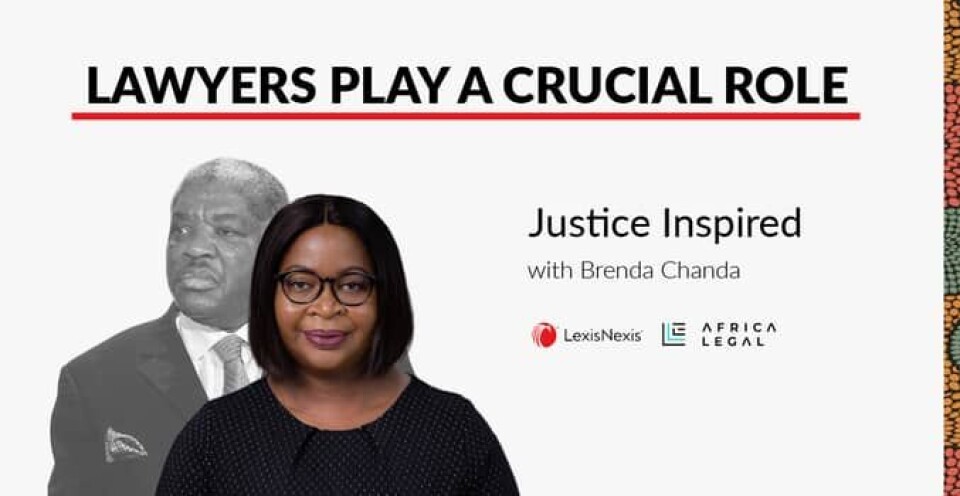Copyright : Re-publication of this article is authorised only in the following circumstances; the writer and Africa Legal are both recognised as the author and the website address www.africa-legal.com and original article link are back linked. Re-publication without both must be preauthorised by contacting editor@africa-legal.com
Justice Inspired: Lawyers have a crucial role

In the fifth of a six-part series showcasing champions of the rule of law in Africa, Brenda Mutale Chanda, Co-Managing Partner of Moira Mukuka Legal Practitioners in Zambia, talked to Africa Legal about lawyers’ roles in upholding the rule of law.
Q: What does the rule of law mean to you and why is it so important?
The rule of law means a society – and the institutions created by that society – abiding by the laws, rules and regulations imposed upon them in the discharge of their obligations and the exercise of their rights. The rule of law creates an orderly, uniform and equal society where laws are applied impartially, and where democratic institutions operate free from the influence of the appointing authority.
Studies have shown that there is a strong correlation between the rule of law and economic growth. Rule of law and constitutionalism also go hand in hand.
Q: Who is the African figure who most inspires your passion and commitment to the rule of law?
The late Dr Levy Patrick Mwanawasa, the third President of the Republic of Zambia, remains highly regarded as one of Zambia’s most effective leaders. During his tenure, he secured significant debt relief, steering Zambia from the status of Highly Indebted Poor Country to a period of sustained economic growth. One of his most noble efforts, however, was the promotion of constitutionalism and the rule of law.
Linda Kasonde, the first female President of the Law Association of Zambia (LAZ), was instrumental in upholding and promoting constitutional values and principles, and the rule of law in the face of serious pressure and opposition. After her term as LAZ President, Kasonde set up Chapter One Foundation, an organisation that promotes and protects human rights, human rights defenders, constitutionalism and the rule of law through strategic litigation, advocacy and capacity building.
Q: How has the rule of law evolved in Africa during your lifetime? Do you have concerns that it’s now under threat?
State capture has become a significant issue in some African countries and has had a negative impact on the rule of law as the institutions created to check the excesses of government have themselves been compromised.
Countries experiencing democratic transition are particularly vulnerable to the manipulation of illicit political finance. This is usually aimed at weakening the democratic pillars of society and capturing politicians and political parties, the media, as well as key state institutions such as the legislature, the executive, the judiciary, and regulatory and enforcement agencies.
The rule of law in Africa continues to be under threat, but Africans have also continually demonstrated that they demand that the rule of law be followed.
Q: What have you done during your legal career to help bolster the rule of law?
My past perception was that promotion of the rule of law was for human rights and constitutional lawyers. Increasingly, however, I am realising that even as a business lawyer I must do my best to promote the rule of law because any breakdown in the rule of law and constitutionalism adversely affects the business environment in which my clients operate.
I promote the rule of law by advising clients on regulatory requirements. My interactions with regulatory agencies that are created by the law for the facilitation of business processes have also been a platform for promotion of the rule of law.
Q: What can the legal profession as a whole do to improve the rule of law in Africa?
Legal professionals are the gatekeepers of the rule of law. Lawyers must regulate client conduct by advising clients, screening cases and legal arguments, avoiding personal participation in improper behaviour, and disclosing confidential information as permitted by the law.
The rule of law cannot be established merely by putting laws on the books, by devoting resources to public enforcement, or even by eliminating corruption. To be effective, the rule of law must also be integrated into the complex, decentralised choices made by millions of individuals and entities, and it is at this stage that lawyers make a critical contribution.
LexisNexis and Africa Legal have launched a ground-breaking new report which shines a light on the trends, barriers and aspirations for the rule of law across Africa.
To read the full report CLICK HERE.
To join Africa Legal's mailing list please click here
